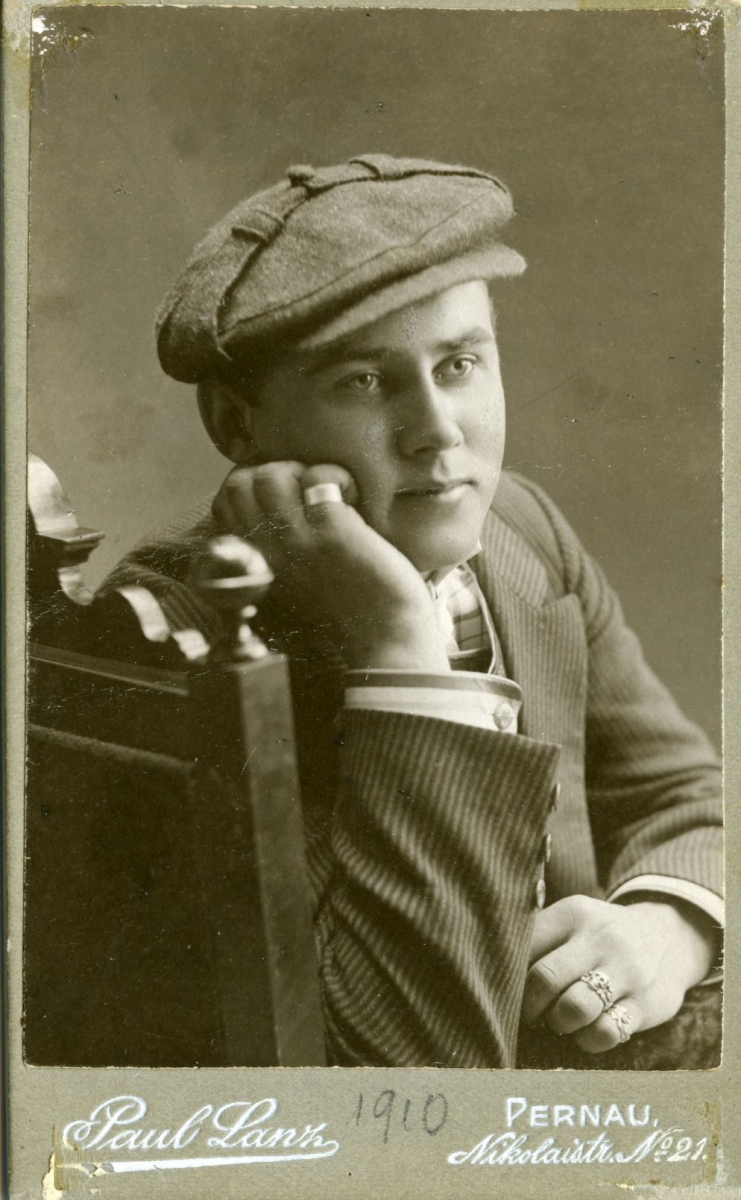
Johannes Barbarus
Johannes Barbarus was the pseudonym of Johannes Vares (12. I 1890 / 31. XII 1889 – 29. XI 1946), a poet, doctor, and politician. He was born in Kiisa, Viljandimaa to a farmer. He completed secondary school in Pärnu and then went to study medicine at the University of Kiev from 1910–1914 in Ukraine. He served as a military physician during both World War I and the Estonian War of Independence for the Estonian army. For his efforts, he was awarded the Cross of Libery, but he refused to accept it.
After completing his degree, he returned to Pärnu, where he worked as a doctor until his transfer to Tallinn in 1939. During the 30s, he traveled quite extensively in Southern and Western Europe as well as in the Soviet Union. After the annexation of Estonia by the Soviet Union in 1940, Vares became the prime minister of the Soviet puppet government and in August of the same year, chairman of the Presidium of the Supreme Soviet of the Estonian SSR. After Nazi-German invasion to Estonia in 1941, Vares fled to Leningrad in 1941, where he remained in exile until the Soviets regained control of Estonia in 1944. Vares’ return to Estonia, however, proved just as dangerous, as he came under the suspicion of the Soviet NKVD for his activities during the Estonian War of Independence. Vares was found dead in 1946 in Kadriorg Palace, Tallinn. It is widely believed that he committed suicide but the exact circumstances surrounding his death remain unclear to this day.
Vares-Barbarus was a prolific writer. His style of verses varied greatly during his career as a poet. Though he didn’t directly participate in politics in the beginning, his left-wing thinking undoubtedly influenced his work. He was a radical socialist and was impressed with the initial ideals of the Soviet Union. His travel experiences also played a role in his worldview and subsequently his writing.
Barbarus’ poems appeared frequently in the journal Looming. He published fourteen collections of verse. His debut was neo-romantist Fata Morgana (1918), followed by expressionist Inimene ja sfinks (‘Man and the Sphinx’, 1919), Katastroofid (‘Catastrophes’, 1920) and Vahekorrad (‘Relations’, 1922). The avant-garde-ish Geomeetriline inimene (‘The Geometrical Man’, 1924) and Multiplitseerit inimene (‘Multiplied Man’, 1927) followed the trends of French modernism and cubism. From then on, Barbarus’ poetry took more realistic turn with the collections Maailm on lahti (‘The World is Open’, 1930), E. V.-r (‘The Estonian Republic’, 1932), Tulipunkt (‘The Focus’, 1934), Memento (1936), Kalad kuival (Fish on Dry Land, 1937), Üle läve (‘Crossing the Threshold’, 1939), Relvastatud värsid (‘Armed Verses’, 1943) and Rindeteedel (On the Roads at the Frontline, 1944).
His anthologies include Kolmnurk (‘The Triangle’, 1921), Vastu voolu (‘Against the Current’, 1946), and Samm-sammult võidule (‘Step by Step to Victory’, 1946). He also published travel letters, short stories, and political writings.
In 1945, he received the title of Merited Writer of the Estonian SSR. His work has been translated into several languages.
M. M.
Books in Estonian
Poems
Fata-Morgana. Tartu: Noor-Eesti, 1918, 70 lk. [E-raamat: Tallinn: Digira, 2016.]
Inimene ja sfinks. Tallinn: Auringo, 1919, 79 lk. [E-raamat: Tallinn: Digira, 2016.]
Katastroofid. Tallinn: Auringo, 1920, 63 lk. [E-raamat: Tallinn: Digira, 2016.]
Kolmnurk: (1910-1920): valik luuletusi kolmest ilmunud kogust, eelsõna, introduktsiooni ja nekro-epiloogiga. Tallinn: Varrak, 1921, 80 lk. [E-raamat: Tallinn: Digira, 2016.]
Vahekorrad: (1920-1922). Tartu: Tarapita, 1922, 95 lk. [E-raamat: Tallinn: Digira, 2016.]
Geomeetriline inimene: V kogu värsse. (s.l.: s.n.), 1924, 109 lk. [E-raamat: Tallinn: Digira, 2016.]
Multiplitseerit inimene: VI kogu värsse. Tallinn: Eesti Kirjanikkude Liit, 1927, 102 lk. [E-raamat: Tallinn: Digira, 2016.]
Maailm on lahti!: VII kogu värsse: 1927-1930. Tallinn: (s.n.), 1930, 121 lk. [E-raamat: Tallinn: Digira, 2016.]
E.V.-r.: VIII kogu värsse & poeeme: 1927-1932. Tallinn: (s.n.), 1932, 144 lk. [E-raamat: Tallinn: Digira, 2016.]
Tulipunkt: IX. kogu värsse. Tallinn: (s.n.), 1934, 159 lk. [E-raamat: Tallinn: Digira, 2016.]
Memento: kaks mälestuspoeemi. Tallinn: Sõprus, 1936, 64 lk. [E-raamat: Tallinn: Digira, 2016.]
Kalad kuival: kümnes kogu värsse. Tartu: Noor-Eesti, 1937, 167 lk. [E-raamat: Tallinn: Digira, 2016.]
Üle läve: XI kogu värsse. Tartus : Noor-Eesti, 1939, 114 lk. [E-raamat: Tallinn: Digira, 2016.]
Relvastatud värsid: 1941-1943. Moskva: ENSV Riiklik Kirjastus, 1943, 79 lk. [E-raamat: Tallinn: Digira, 2016.]
Rindeteedel 1942-1944. Tallinn: Ilukirjandus ja Kunst, 1944, 75 lk. [E-raamat: Tallinn: Digira, 2016.]
Samm-sammult võidule. 2: valik luuletusi 1939-1945. Tallinn: Ilukirjandus ja Kunst, 1946, 150 lk.
Vastu voolu: valik varemilmunud luulekogudest aastaist 1920-1940. Tallinn: Ilukirjandus ja Kunst, 1946, 200 lk.
Johannes Barbarus. Tallinn: Eesti Raamat, 1965, 139 lk. [Sari ’Väike luuleraamat’.]
Relvastatud värsid. Koostanud Endel Sõgel. Tallinn: Eesti Raamat, 1970, 96 lk.
Vastu voolu; Samm-sammult võidule. Tallinn: Eesti Raamat, 1981, 227 lk. [Luuletused 1920-1945.]
Short stories
Kolm juttu. Tallinn: Ajalehtede-Ajakirjade Kirjastus (Loomingu Raamatukogu), 1960, 48 lk.
Collected works
Kogutud teosed, 1. köide: Luuletused. 1: 1910-1939. Tallinn: Ilukirjandus ja Kunst, 1948, 413 lk.
Kogutud teosed, 2. köide: Luuletused. 2: 1939-1946. Tallinn: Ilukirjandus ja Kunst, 1948, 281 lk.
Kogutud teosed, 3. köide: Reisikirjad ja kirjanduslikud artiklid. Tallinn: Ilukirjandus ja Kunst, 1950, 198 lk.



